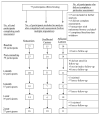Perceived risk following melanoma genetic testing: a 2-year prospective study distinguishing subjective estimates from recall
- PMID: 24322567
- PMCID: PMC4028391
- DOI: 10.1007/s10897-013-9676-1
Perceived risk following melanoma genetic testing: a 2-year prospective study distinguishing subjective estimates from recall
Abstract
A major goal of predictive genetic testing is to alert people to their risk before illness onset; however, little is known about how risk perceptions change following genetic testing and whether information is recalled accurately over time. In the United States, a CDKN2A/p16 mutation confers 76 % lifetime risk of melanoma. Following genetic counseling and test reporting, subjective risk estimates and recall of counselor-provided risk estimates were assessed 5 times over the next 2 years among 60 adult members of 2 extended CDKN2A/p16 kindreds. No sustained changes from baseline in risk perceptions were reported. Unaffected carriers (n = 15) consistently reported significantly lower subjective risk estimates (46 %) than they were actually given (76 %, p < 0.001) or recalled having been given (60 %, p < 0.001). Noncarriers' (n = 27) risk estimates decreased following results disclosure, but rebounded, with both subjective and recalled estimates subsequently exceeding what they were told by the counselor (both ps < 0.001). Affected carriers' (n = 18) risk estimates for developing a new melanoma corresponded well to counselor-provided information (p = 0.362). For all 3 patient groups, results were consistent across multiple risk measures and remained similar when demographic, phenotypic, and baseline behavioral contributors to melanoma risk were statistically controlled. These findings are consistent with other studies of risk perception, but additional studies of more diverse populations are needed to understand the reasons behind both the persistence of initial risk estimates and their divergence from information provided by the counselor during genetic counseling. Additionally, determining whether holding subjective risk perceptions that differ from counselor-provided information ultimately affects adherence to management recommendations will help guide the presentation of risk information in genetic counseling practice.
Conflict of interest statement
Lisa G. Aspinwall, Jennifer M. Taber, Wendy Kohlmann, Samantha L. Leaf, and Sancy A. Leachman declare that they have no conflict of interest.
Figures



References
-
- Armor DA, Taylor SE. Situated optimism: Specific outcome expectancies and self-regulation. In: Zanna MP, editor. Advances in Experimental Social Psychology. Vol. 30. 1998. pp. 309–379.
-
- Aspinwall LG, Leaf S, Dola E, Kohlmann W, Leachman S. CDKN2A/p16 genetic test reporting improves early detection intentions and practices in high-risk melanoma families. Cancer Epidemiology, Biomarkers & Prevention. 2008;17(6):1510–1519. - PubMed
-
- Aspinwall LG, Leaf S, Kohlmann W, Dola E, Leachman S. Patterns of photoprotection following CDKN2A/p16 genetic test reporting and counseling. Journal of The American Academy of Dermatology. 2009;60(5):745–757. - PubMed
-
- Aspinwall LG, Richter L, Hoffman RR. Understanding how optimism “works”: An examination of optimists’ adaptive moderation of belief and behavior. In: Chang EC, editor. Optimism and pessimism: Theory, research, and practice. Washington: American Psychological Association; 2001. pp. 217–238.
-
- Aspinwall LG, Taber JM, Leaf SL, Kohlmann W, Leachman SA. Genetic testing for hereditary melanoma and pancreatic cancer: A longitudinal study of psychological outcome. Psychooncology. 2013a;22(2):276–289. - PubMed
Publication types
MeSH terms
Grants and funding
LinkOut - more resources
Full Text Sources
Other Literature Sources
Medical
Miscellaneous

